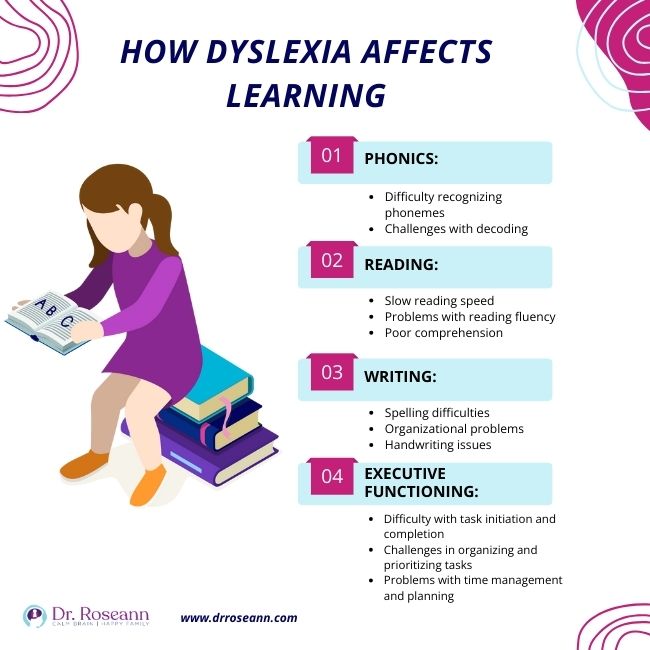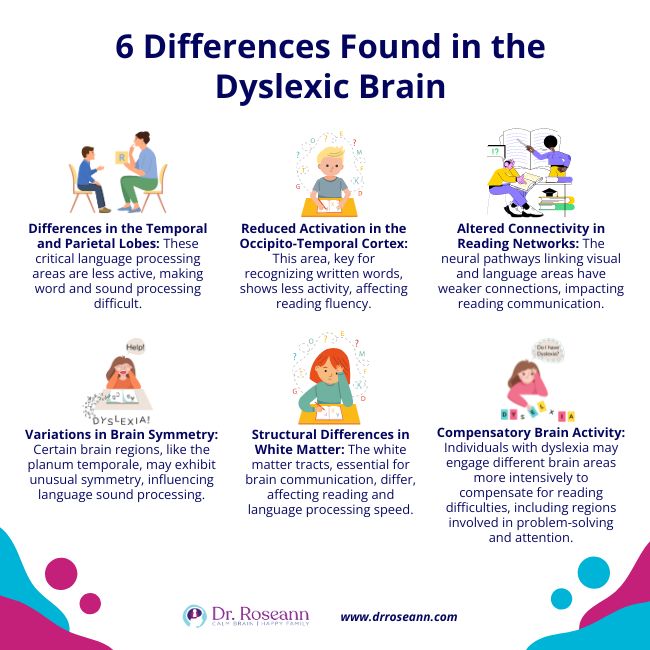Imagine trying to solve a puzzle where the pieces keep shifting. That's a bit like what reading feels like for someone with dyslexia. Recently, there's been a lot of talk about dyslexia, a learning difference that makes reading and writing more difficult than usual. But there's a bigger question on many parents' minds: Does dyslexia fit into the world of neurodiversity?
As someone who's spent years working alongside families as their mental health expert navigating the waters of neurodivergence, with such a rise in neurodivergence, organizations and parents are looking for ways to foster communication and skills.
As a parent of dyslexic and having spent two decades assessing children with reading disabilities, I know just how dyslexia's unique challenges and strengths play a role in the broader neurodiverse community.
Neurodivergence and Dyslexia Explanation
To start, let's clarify the terms. Neurodivergence encompasses a broad spectrum of neurological conditions that span a wide array of cognitive styles, abilities, and experiences. These conditions may include but are not limited to autism, ADHD, AuDHD, dyslexia, dyscalculia, Tourette syndrome, and others.
Each neurodivergent individual possesses a unique cognitive profile, characterized by differences in perception, communication, social interaction, and information processing. It's important to recognize that neurodivergence is not inherently negative. Rather, it reflects the rich diversity of human cognition and experience.
Embracing neurodiversity involves acknowledging and valuing the unique perspectives and contributions of people with diverse neurological profiles, fostering inclusivity, acceptance, and support in all aspects of society.
Dyslexia, on the other hand, is commonly understood as a complex neurological condition characterized by difficulties in reading, spelling, and sometimes writing. It involves challenges in accurately and fluently decoding words, recognizing spelling patterns, and understanding written language, despite adequate intelligence, motivation, and educational opportunities.
These difficulties can vary in severity and may manifest differently in each individual. Dyslexia is not indicative of a lack of intelligence or effort but reflects differences in the way the brain processes and interprets written information.
These differences may be attributed to variations in brain structure and function, particularly in areas responsible for language processing and phonological awareness. Despite its challenges, children with dyslexia often demonstrate strengths in areas such as creativity, problem-solving, and visual thinking.
If your child is non neurotypical meaning his neurological functioning deviates from what is considered typical or conventional. It's then essential to provide tailored support and understanding to address their unique strengths and challenges.

Are Dyslexics Neurodivergent?
Yes, dyslexia is a neurological disorder and those who have it are considered neurodivergent. The term “neurodivergent dyslexia” emphasizes that dyslexia falls within the spectrum of neurodivergence.
Since dyslexia is a form of neurodivergence, it means that the individuals who have it may have neurological differences that do not conform to the typical or expected patterns of cognitive functioning.
Understanding dyslexia within the context of neurodivergence promotes acceptance, inclusivity, and appreciation for the diverse ways in which individuals perceive and interact with the world. By recognizing and valuing these differences, we can create environments that support the needs and strengths of all individuals, fostering a more inclusive and equitable society.
Dyslexia vs Autism: Is Dyslexia Autism?
While dyslexia and autism are distinct conditions, there is an association between the two. Even so, the question, “Is dyslexia part of autism?” arises too frequently. It's essential to understand that dyslexia and autism can coexist. However, they are separate entities (Rumsey & Hamburger, 1990).
But can someone be dyslexic and autistic? Yes. Furthermore, a person can be dyslexic without being autistic, and vice versa. It's important to recognize that the dyslexia neurological disorder can manifest independently of other conditions such as autism.
One of the intriguing aspects of dyslexia is how dyslexic individuals perceive written language. Exploring what dyslexics see and how they think differently provides valuable insights into the cognitive processes involved. Understanding dyslexic thinking goes beyond the challenges and sheds light on the unique strengths dyslexics may possess.
Dyslexia as a Neurological Disorder
Is dyslexia a neurological disorder? Yes, it is. Dyslexia involves differences in the way the brain processes written information, making it a neurological condition. Understanding dyslexia as a neurological disorder is crucial for appreciating the unique cognitive processes that dyslexic individuals experience.
As we delve into the dyslexia explanation, we recognize that it covers more than just difficulty with reading. It involves a neurodivergent reading style that can impact various aspects of an individual's life beyond academics, such as organizational skills and time management.
Additionally, the definition of dyslexic persons extends beyond struggles with reading, as they experience a diverse range of strengths and challenges. This highlights the importance of embracing neurodiversity and providing inclusive support systems.

Retraining the Dyslexic Brain
There has been ongoing research on retraining the dyslexic brain with a particular focus on dyslexia in adults (Heim et al., 2014). These studies explore interventions and programs designed to address reading and spelling difficulties. It capitalizes on the neuroplasticity of the brain, which allows for changes and improvements even in adulthood.
As we retrain the dyslexic brain, reviews have shown promising results. It only proves that targeted interventions can lead to significant improvements in reading abilities for children with dyslexia.
Recognizing dyslexia as a form of neurodivergence is essential for fostering understanding and support. While dyslexia and autism share some connections, it's crucial to acknowledge them as distinct conditions. Embracing neurodiversity allows us to appreciate how our kids think and learn, promoting inclusivity and acceptance.
What affects how a dyslexic person sees words?
How a dyslexic person sees words is influenced by neurological differences, phonological processing deficits, visual challenges, working memory limitations, and individual variability. These factors collectively contribute to the unique way dyslexic individuals process and perceive written language, impacting their reading and spelling abilities.
How do dyslexics think differently?
Dyslexics often think spatially and creatively, utilizing strengths in visual and holistic thinking, which can lead to unique problem-solving approaches.
How do dyslexic brains work?
Dyslexic brains function differently in processing language, with variations in the activation of specific regions related to reading and language skills.
How does dyslexia work in the brain?
Dyslexia involves differences in neural pathways responsible for decoding written language, affecting reading fluency and comprehension.
What does non-neurotypical mean?
Non-neurotypical refers to individuals whose neurological functioning deviates from what is considered typical or conventional.
What is dyslexia like?
Dyslexia is a neurodivergent condition where individuals may face challenges in reading, spelling, and written language processing.
What does dyslexia affect?
Dyslexia primarily affects language-related skills, impacting reading, writing, and spelling abilities.
What is dyslexic thinking?
Dyslexic thinking involves a unique cognitive style that may emphasize visual and creative approaches to problem-solving.
What does dyslexia do?
Dyslexia affects the way individuals process written information, leading to challenges in reading and spelling.
What is it like having dyslexia?
Having dyslexia means navigating a world where reading and writing tasks may be more challenging, but also where creative and visual thinking can be strengths.
What does it mean to be dyslexic?
Being dyslexic means having a neurodivergent condition that influences how an individual processes written language, often involving strengths in creative thinking alongside challenges in traditional literacy skills.
Is dyslexia a learning difficulty?
Dyslexia is considered a neurodivergent condition and a learning difficulty. It involves specific challenges in reading, spelling, and written language processing, stemming from unique neurological differences that impact how individuals with dyslexia approach and engage with written information.
Is dyslexia on the spectrum?
No, dyslexia is not on the spectrum. While there is an association between dyslexia and autism, they are distinct conditions. Dyslexia is a neurodivergent condition primarily affecting reading and language skills, whereas autism spectrum disorder encompasses a broader range of social, communication, and behavioral challenges.
What do dyslexic people see?
Dyslexic people may experience challenges in how they perceive and interpret written language. This can involve difficulties in recognizing the shapes and forms of letters and words due to neurological differences, impacting their reading and spelling abilities.
Is there a positive side to dyslexia?
Yes, there can be a positive side to dyslexia. Dyslexic individuals often possess unique strengths such as creative thinking, visual-spatial abilities, and problem-solving skills. While they may face challenges in traditional literacy, these strengths contribute to a diverse cognitive landscape that can be advantageous in various contexts.
Can dyslexia get worse?
The severity of dyslexia symptoms may vary among individuals, and while interventions and support can be beneficial, dyslexia itself does not typically get worse over time. However, addressing challenges early through appropriate strategies and interventions can significantly improve outcomes for individuals with dyslexia.
Citations
Heim, S., Pape-Neumann, J., van Ermingen-Marbach, M., Brinkhaus, M., & Grande, M. (2014). Shared vs. specific brain activation changes in dyslexia after training of phonology, attention, or reading. Brain Structure and Function, 220(4), 2191–2207. https://doi.org/10.1007/s00429-014-0784-y
Rumsey, J. M., & Hamburger, S. D. (1990). Neuropsychological divergence of high-level autism and severe dyslexia. Journal of Autism and Developmental Disorders, 20(2), 155–168. https://doi.org/10.1007/bf02284715
Dr. Roseann is a mental health expert in Neurodivergence who frequently is in the media:
- Helping Children Thrive Podcast Benefits of Neurofeedback for children with ADHD
- Very Well Mind What Is Asperger Syndrome?
- Parents Are Your Kid's Meltdowns a Sign of Rejection Sensitive Dysphoria?
Always remember… “Calm Brain, Happy Family™”
Disclaimer: This article is not intended to give health advice and it is recommended to consult with a physician before beginning any new wellness regime. *The effectiveness of diagnosis and treatment vary by patient and condition. Dr. Roseann Capanna-Hodge, LLC does not guarantee certain results.
Are you looking for SOLUTIONS for your struggling child or teen?
Dr. Roseann and her team are all about science-backed solutions, so you are in the right place!
Grab your complimentary copy of
147 Therapist-Endorsed Self-Regulation Strategies for Children: A Practical Guide for Parents
Dr. Roseann is a Children’s Mental Health Expert and Licensed Therapist who has been featured in/on hundreds of media outlets including The Mel Robbins Show, CBS, NBC, PIX11 NYC, Today, FORBES, CNN, The New York Times, The Washington Post, Business Insider, Women’s Day, Healthline, CNET, Parade Magazine and PARENTS. FORBES called her, “A thought leader in children’s mental health.”

She coined the terms, “Re-entry panic syndrome” and “eco-anxiety” and is a frequent contributor to media on mental health.
Dr. Roseann Capanna-Hodge has three decades of experience in working with children, teens and their families with attention-deficit hyperactivity disorder (ADHD), autism, concussion, dyslexia and learning disability, anxiety, Obsessive Compulsive Disorder (OCD), depression and mood disorder, Lyme Disease, and PANS/PANDAS using science-backed natural mental health solutions such as supplements, magnesium, nutrition, QEEG Brain maps, neurofeedback, PEMF, psychotherapy and other non-medication approaches.
She is the author of three bestselling books, It’s Gonna Be OK!: Proven Ways to Improve Your Child's Mental Health, The Teletherapy Toolkit, and Brain Under Attack. Dr. Roseann is known for offering a message of hope through science-endorsed methods that promote a calm brain.
Her trademarked BrainBehaviorResetⓇ Program and It’s Gonna be OK!Ⓡ Podcast has been a cornerstone for thousands of parents facing mental health, behavioral or neurodevelopmental challenges.
She is the founder and director of The Global Institute of Children’s Mental Health, Neurotastic™Brain Formulas and Dr. Roseann Capanna-Hodge, LLC. Dr. Roseann is a Board Certified Neurofeedback (BCN) Practitioner, a Board Member of the Northeast Region Biofeedback Society (NRBS), Certified Integrative Mental Health Professional (CIMHP) and an Amen Clinic Certified Brain Health Coach. She is also a member of The International Lyme Disease and Associated Disease Society (ILADS), The American Psychological Association (APA), Anxiety and Depression Association of America (ADAA) National Association of School Psychologists (NASP), International OCD Foundation (IOCDF).
© Roseann-Capanna-Hodge, LLC 2024










